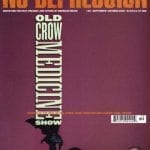Lambchop – Toward a unified theory of vinyl evolution
Despite fan-generated rumors to the contrary, Kurt Wagner does not hate his home turf of Nashville. The earnest leader of the sometimes fourteen-piece ensemble Lambchop still lives there out of a kind of loyalty to its history and aesthetics. “I don’t resent anything about Nashville,” he says. “I’m a pretty good representation of a local Nashvillian who has grown up here.”
His band is hardly representative of Nashville, though, fitting into no clear-cut genre while often insisting — in the liner notes to much of their discography — that fans visit the Country Music Hall Of Fame. Lambchop may be another animal entirely, but Wagner has no reactionary bone to pick with the modern song- and-star-factory of Music Row.
“In the last few years, I’ve actually come to appreciate that machine, whatever its badness, or cheese, is,” Wagner says. “I’ve come to realize that contemporary country has something about it that’s cool in itself. I have a new sort of appreciation for country music as it is today, stuff like Toby Keith and his ilk. He does have some good songs.
“There is something good that is still there, and that’s something that I didn’t give a chance when I was younger, or maybe even five years ago, as far as how I looked at what Nashville was. And it came from sort of a twisted, adolescent-growing-up-in-Nashville kind of view, as you are when you’re young and you want to react against established craft.”
Wagner, a classic guitar collector unafraid to cite the 1920s vintage of a particular six-string on a song credit, refused to take the bait when I named certain crossover phenoms or rugged-but-prettyboys who merely cradled expensive guitars onstage, without playing them.
“For example, Alan Jackson is a very cool dude,” he offered. “As far as the country goes, if you want to talk about people, the guy is actually really together about what he believes about art. I can’t speak for how he’s been produced and how he’s been presented. That’s the kind of stuff that maybe gets a little twisted in the Nashville way, how they market things.
“The marketing of the country artist is definitely out of control, dude; it might as well be the World Wrestling Federation. It’s got nothing to do with the artist. I’ve got a new way of looking at it and I really do think there’s something cool about it, and I think it’s the same something that I found cool when I grew up and found country music cool again, when I found the ’60s stuff and the ’70s stuff to be cool. I’m starting to find those kinds of qualities in the crappy ’80s and ’90s.”
But won’t gazing favorably into that potential abyss one day allow it to gaze back at Lambchop? “Yeah, I hope I don’t turn into a geezer or anything,” he says. “I do think that there’s stuff of value there. I’m not sure how much it effects what Lambchop does. I find country as interesting as any other crap on the fucking radio. There’s a lot of rock and shit like that I frankly don’t get. I’m more interested in listening to contemporary country than what I hear on mainstream rock.”
Lambchop’s sound seems to imagine a mythical alternate world in which country, soul, jazz, and even pre-Kennedy lounge music merged — a unified theory of vinyl evolution, if you will, complete with punk’s celebration of individual wanderlust. The band’s new album Damaged, released August 22 on Merge Records, closes with a tune called “The Decline Of Country And Western Civilization” (also the title of a recent B-sides and rare-tracks compilation), but Wagner resists admitting that the song is a jeremiad against the current scene.
“There wasn’t really a ‘peak’ of country and western civilization,” he contends. “That idea is partly just a reference to the two films named The Decline Of Western Civilization, about punk and metal, respectively. In my mind they sort of related to Lambchop’s approach to country and western.”
“The Decline Of Country And Western Civilization” is rife with critique, though. Wagner sings in a more aggravated tone than he does elsewhere, and begins by citing his disdain for Confederate general and KKK founder Nathan Bedford Forrest, whom he calls the “featured artist in the devil’s chorus.” The region may be historically accursed, but Lambchop’s haggard yet hospitable southern-ness is part of its huge overseas appeal.
“I think that Europeans really appreciate it,” Wagner acknowledges, “which is sort of surprising because you think that Europe in general has a black-and-white view of America and that there aren’t all these different shapes and colors within the country. But they definitely understand that otherness of what Lambchop is.
“They’ve a big thing for southern culture in general. There’s a general darkness, a musty, humidity-filled darkness that a lot of southern literature and what I consider good southern music has, and they respond to that. I don’t know why. There are words in various European languages for it, and I’m not sure we even have a word for it here, in our own culture. For the last record, we did five shows in the States and a hundred in the rest of the world.”




